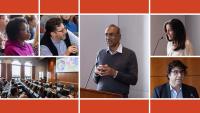Daniel Belsky, PhD
- Associate Professor of Epidemiology (in the Robert N. Butler Columbia Aging Center)
On the web

Overview
Daniel Belsky, PhD, is an Associate Professor of Epidemiology in the Mailman School of Public Health (Department of Epidemiology and Robert N Butler Columbia Aging Center) at Columbia University Irving Medical Center (CUIMC).
In his research, Dr. Belsky aims to reduce social inequalities in aging outcomes in the US and elsewhere. His research sits at the intersection of public health, population & behavioral science, and genomics. His studies seek to understand how genes and environments combine to shape health across the life course. Using tools from genome science and longitudinal data from population-based cohort studies and randomized trials, he aims to identify targets for policy and clinical interventions to promote positive development and extend healthspan. Dr. Belsky received his PhD in Health Policy & Management from the Gillings School of Public Health, University of North Carolina at Chapel Hill and completed his postdoctoral training at the Center for the Study of Aging and Human Development, Duke University Medical Center.
Academic Appointments
- Associate Professor of Epidemiology (in the Robert N. Butler Columbia Aging Center)
Gender
- Male
Credentials & Experience
Education & Training
- BA, 2002 Swarthmore College
- PhD, 2012 University of North Carolina at Chapel Hill Gillings School of Public Health
Editorial Boards
- Journals of Gerontology
- Demography
Honors & Awards
2023 Academy of Behavioral Medicine Neal Miller New Investigator Award
2023 University of Rochester Aging Research Day Keynote Speaker
2020 American Journal of Epidemiology Reviewer of the Year
2020- ISI Highly Cited Scholar
2019 Canadian Institute for Advanced Research (CIFAR) CBD Network Fellow
2018 Jacobs Foundation Young Scholar
2015 Jacobs Foundation Early Career Research Fellowship (2016-18)
2014 National Institute on Aging Butler Williams Scholar
2012 NIH Loan Repayment Program Award from the National Institute on Minority Health and Health Disparities
Research
Dr. Belsky's research sits at the intersection of public health, population & behavioral sciences, and genomics. His studies seek to understand how genes and environments combine to shape health across the life course. The goal of Dan's work is to reduce social inequalities in aging outcomes in the US and elsewhere.
Dan’s focus for the past several years has been on development and evaluation of methods to quantify the pace and progress of biological process of aging in young, mid-life, and older-adult humans and the application of these methods to study:
- How life-history and social factors contribute to individual differences in healthy aging
- Whether and how aging processes can be modified by intervention.
With collaborators Terrie Moffitt and Avshalom Caspi he originated the Pace of Aging method to quantify the aging process from longitudinal analysis of human physiology and recently translated this method into a DNA-methylation blood test that can be implemented from a single time point of data collection. He is principal investigator of NIH-funded projects to test how caloric restriction may slow or reverse aging-related changes to the genome (CALERIE), to understand long-term impacts of in-utero famine exposure on biological aging (Dutch Hunger Winter Family Study, with Bertie Lumey), and to test the potential of anti-poverty policy intervention to slow biological aging (MyGoals for Healthy Aging, with Peter Muennig). Dan's work has received international attention, including by the Wall Street Journal, Washington Post, and Guardian newspapers, and appeared in outlets including PNAS, Nature Human Behaviour, Nature Aging, the JAMA journals, Lancet Respiratory Medicine, and top journals in epidemiology and gerontology. Since 2020, he has been named an ISI highly-cited researcher. (current CV)
Research Interests
- Aging
- Biostatistical Methods
- Chronic disease
- Community Health
- Genetics
Selected Publications
- Belsky DW & Baccarelli AA. To promote healthy aging, focus on the environment. Nature Aging, 3(11)1334-1344, 2023.
- Waziry R¶#, Ryan CP¶#, Corcoran DL, Graf G#, Huffman KM, Kobor MS, Kothari M#, Kraus VB, Kraus WE, Lin DTS, Pieper CF, Ramaker ME, Bhapkar M, Das SK, Ferrucci L, Hastings WJ, Kebbe M, Parker DC, Racette SB, Shalev I, Schilling B, Belsky DW*. Effect of Long-Term Caloric Restriction on DNA Methylation Measures of Biological Aging in Healthy Adults: CALERIE™ Trial Analysis. Nature Aging, 3(3):248-257, 2023. PMC10148951
- Cheng M#, Conley D, Kuipers T, Li C, Ryan CP#, Taubert J, Wang S, Wang T, Zhou J#, Schmitz LL, Tobi EW, Heijmans BT, Lumey LH, Belsky DW*. Accelerated biological aging six decades after prenatal famine exposure. Proceedings of the National Academy of Sciences of the USA (PNAS), 121 (24) e2319179121, 2024. PMC11181019
- Belsky DW*, Caspi A, Corcoran DL, Sugden K, Poulton R, Arseneault L, Baccarelli A, Chamarti K, Gao X, Hannon E, Harrington HL, Houts R, Kothari M#, Kwon D#, Mill J, Schwartz J, Vokonas P, Wang C, Williams B, Moffitt TE. DunedinPACE: A DNA methylation biomarker of the Pace of Aging. eLife, 11:e73420, 2022. PMC7282814
- Belsky DW*, Caspi A, Houts R, Corcoran D, Cohen HJ, Danese A, Harrington HL, Israel S, Levine M, Schaefer J, Sugden K, Williams B, Yashin AI, Poulton R, Moffitt TE. Quantification of biological aging in young adults. Proceedings of the National Academy of Sciences (Plus) USA. 112(30):E4104-4110, 2015. PMC4522793
Current NIH Projects as PI/MPI
- R01AG087158 Testing effects of cash transfers on biological aging and risk for Alzheimer's
- R01AG073402 The MyGoals for Healthy Aging Multi-Center Randomized Controlled Trial
- R01AG066887 Genetic analysis of the Dutch Hunger Winter Families Study to Boost Rigor and Robustness for Testing In-Utero Famine Effects on Aging-Related Health Conditions and Biological Aging
- R01AG061378 Genomic analysis of the CALERIE™ Trial to generate new knowledge for geroscience
Global Health Activities
PROMENTA: The PROMENTA Research Center aims to provide answers to three central questions in mental health, well-being, and drug use research: -What processes lead to poor and good mental health, and how? -How do social and geographic inequalities in mental health arise? -How can we develop, tailor, and evaluate effective interventions in communities to promote good mental health? To address these questions, we examine sources of mental health on a variety of levels, such as genetic risk, neuro-cognitive development, the psychosocial environment, and the socio-cultural and political context.




